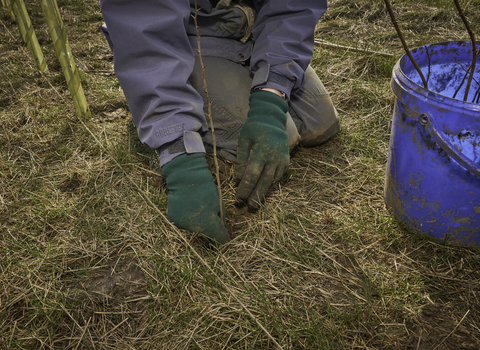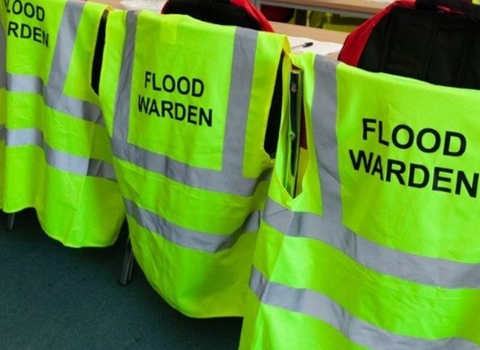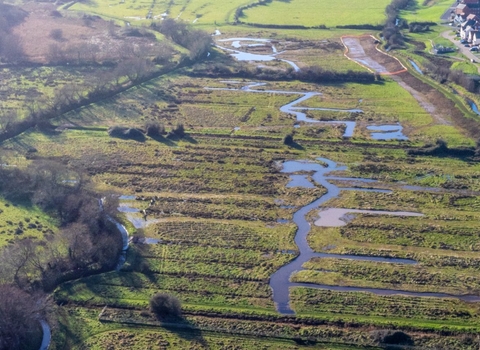Act local
Parish and town councils are in a great position to act on climate change, but everyone has a part to play. Think about involving people from your local pub, school, book club, football club, Women’s Institute, allotment association, or even local businesses, professional bodies or friendly societies. Find out what community groups in Somerset have been dong in their areas.

Tree planting. Photo: Richard Osbourne
Westbury-Sub-Mendip Tree Group
During lockdown, Buffy Fletcher noticed just how bad the situation was for the many trees in her village. Ash dieback was starting to take hold, and the effects of climate change were becoming increasingly evident with unusually hot spring weather.
Despite the difficulties of organising and fundraising during the pandemic, Buffy pulled together interested people in the community to form the Westbury-Sub-Mendip Tree Group. Since 2020, the group has started its own nursery, developed members’ skills, and organises regular volunteering days, putting 3,500 trees in the ground around the parish during winter 2021-22 alone.
The tree group has pulled in funding, ideas and help from organisations including Mendip Hills AONB and Somerset Rivers Authority & Farming and Wildlife Advisory Group South West (FWAG SW)’s Trees For Water project, and has developed good relationships with local landowners.

Martock Flood Wardens and Slow the Flow
Martock has experienced several flooding events, with roads in and out of the village often becoming impassable, such as during the 2013/14 floods.
The community has an active Flood Warden Group, which monitors river levels and coordinates responses to flooding events. Additionally, the group has identified opportunities to address flood risk using Slow the Flow techniques. The group has worked with FWAG SW, meeting local landowners and visiting sites across the catchment to find suitable locations for Slow the Flow structures to be installed, as well as existing structures that could be restored or adapted to store floodwaters, reducing downstream flood risk.
The group’s expertise and approach to flood management and adaptation has been recognised by Defra, who asked for their involvement in a Natural Flood Management ‘toolbox’, which will help other communities to replicate their successes.

Bridgwater Meads – restoring floodplain grazing marsh
With its position on the banks of the River Parrett and the mounting impacts of climate change, Bridgwater is facing an increased threat of flooding.
Recognising a need to help the town adapt to this risk, a partnership led by The Wildfowl and Wetlands Trust (WWT) came together to restore The Meads, an area of floodplain grazing marsh that had been drained for farming. Work began in 2021 to rewet and restore the site, including the revival of the former course of the Durleigh brook, allowing ditches to fill up with water and creating a mosaic of habitats.
Local volunteers planted new reedbeds and are helping to monitor water levels and wildlife. All of this work allows more water to be stored for longer, protecting the town following heavy rainfall and creating fantastic habitats for nature. The project will also improve public access by creating new walkways and bridges, and re-establish nature-friendly farming on The Meads, demonstrating how nature and farming can go hand in hand.

Retrofit Bruton and Cary
When Bruton Town Council declared a climate emergency in March 2019, members felt that the urgency of climate change demanded strong, decisive action. Poorly insulated houses lose heat quickly, so more CO2 is produced as people try to keep their homes warm.
The Town Council homed in on this issue as something they could start working on locally. The Centre for Sustainable Energy came in as a partner with expertise, and the Town Council was awarded £75k from the Somerset County Council climate emergency fund. This was used to employ a retrofit coordinator to undertake assessments of people’s homes.
The Town Council has had to concentrate on the able-to-pay market because of the local scale, but it joined forces with the District Councils on the Somerset Retrofit Accelerator Project, working with the Centre for Sustainable Energy to offer discounted assessments. The Bruton scheme’s work on insulation has created warmer, more comfortable homes, helped cushion against extreme heat, and is a great model for other communities that want to make a difference.
Adaptation actions
Plenty of adaptation actions are simple to carry out, giving you some quick wins.
Keep up to date with our work across the county
Sign up below to receive the latest news from Somerset Wildlife Trust, learn about great events near you and learn how you can help wildlife in your local area.



